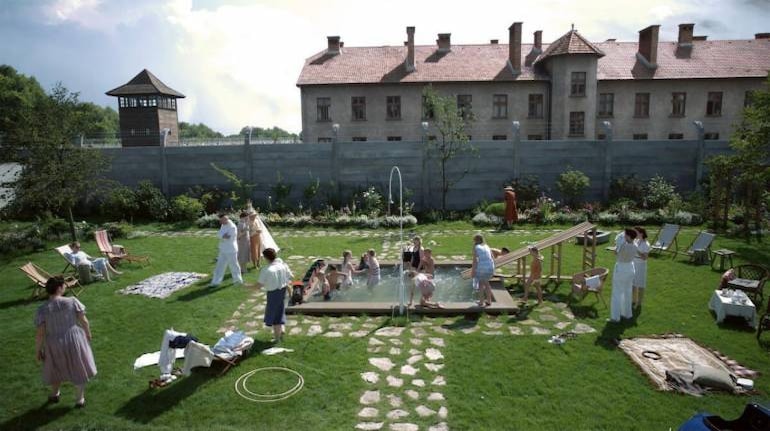



In a sequence from Jonathan Glazer’s The Zone of Interest, a disgruntled wife urges her husband to reconsider his transfer orders. Displacement would spell disaster for the continuity she has nursed as an intimate project. “My job is to raise the children,” she says as a sort of commanding appeal, to a husband surprisingly willing to listen. The bickering quality of this conversation is relatable, a sort of middle-class quibble that echoes domesticity in the way we have all encountered it. Uprooting someone, who has spent time and valuable resources into adopting a place, a milieu is akin to exiling a patriot. It explains the strain in her voice, and the boldness of her solution – maybe he should go alone. Except what’s abnormal about this decoupling moment of frisson, is its historical backdrop. The Zone of Interest is possibly the most unsettling of this year’s Oscar-nominated films and it breaks new ground by unshrouding evil as a banal, everyday exercise.
Sandra Huller (also exceptional in the Oscar-nominated Anatomy of a Fall) plays Hedwig Hoss, the wife of Rudolf Hoss (Christian Friedel), the commandant of Auschwitz prison. The Hoss’ live right next to the infamous gas chambers, with barb wires dripping over the fences of what is a lavishly assigned mini-paradise next door. The couple lead what seems like an ordinary life - fishing, picnicking and occasionally addressing the sights beyond the walls. That, sort of, is the essence of the film. The conventionality of living in shadow of startling inhumanity. The acting is unanimated, surreally uneventful and so are the narrative pivots. Not a lot happens here, except petty domestic arguments, official promotions and expected nuisance courtesy the Hoss’ many children. Colleagues visit, calls about lilacs being destroyed are made and professional rivalries dissected in what feels like a decoloured soap opera about a family living unaffected by the fires – quite literally – burning next door.
"We saw it as two films: a film that you see without any violence, and the film that you hear where we introduce this violence." Jonathan Glazer and his creative collaborators on the making of Oscar-nominated The Zone of Interest — Now in theaters and available to watch at home. pic.twitter.com/pFZ9ilmjpk— A24 (@A24) February 20, 2024
The horrors of Glazer’s film aren’t shown as much as they are played to our subconscious. We momentarily hear screams and wails fracture the consistency of polite conversations, like listening in on a rumour without the human tendency of wanting to look. It’s chilling to view a family, an entire entourage of officers, servants, children and collaborators waltz through a domestic setup more concerned about the litter on the floor and the wetness of the ceiling as opposed to the massacre happening in the neighbourhood. The texture is intentionally stripped of grandeur, but the Hoss’ house retains that sunny streak of romantic bliss. It almost feels like the perfect home, the perfect life, except it’s in service of something ghastly, evil and unacknowledged.
 The Hoss’ house retains that sunny streak of romantic bliss. (Image source: The Zone Of Interest via X/@kenzvanunu)
The Hoss’ house retains that sunny streak of romantic bliss. (Image source: The Zone Of Interest via X/@kenzvanunu)
Glazer’s film obviously propounds the idea of banality. The fact that men and women can become monstrous with ease so astounding, it feels almost impossible to reconcile them to anything recognisably human. It’s not the body, it’s the emotion, the vulnerability and the kindness after all.
But the holocaust offers is own surgical conundrums, the understanding of which can only really be expanded but never quite concluded. To that effect Glazer’s film is a stripped down, de-commercialised vessel of brutality.
The fact that it shakes you without displaying a drop of blood or a draught of flesh-incinerating smoke, is possibly its greatest accomplishment. It’s like watching an ASMR video from hell, made all the more disconcerting by the delusional comfort of the protagonists. The Hoss’ are their own private heroes, until of course they have to move, mow a lawn or god-forbid do their own laundry.
 The Zone of Interest: Rudolf Hoss (Christian Friedel), the commandant of Auschwitz prison. (Image source: X/@kenzvanunu)
The Zone of Interest: Rudolf Hoss (Christian Friedel), the commandant of Auschwitz prison. (Image source: X/@kenzvanunu)
Both Huller and Friedel are tasked with difficult roles here. They have to embody a lightness of being, despite their respective place in history. It’s impossible perhaps to detach yourself from the burden of performing, but Glazer manages to exert great control. There is a scene in which Rudolf discusses the mechanics of an incinerator with his colleagues. It’s pitched like a couple of men talking racing cars. Their pupils dilate, their excitement though is calculated. It’s like repairing the phone line or working the radio next morning. Nothing extraordinary or otherworldly, so to speak.
Glazer’s film isn’t for everyone. It has this documentary like texture and grammar, where the camera remains steadfast focused on the symmetry of things. There is no emotional turmoil or fragile social issues to deal with, except the unremarkable lives and careers that men of Adolf Hitler’s Reich, build under his treacherous reign. It’s an astonishing leap of faith that has to be nursed more like a reluctant wound than to be guzzled like a shot of anti-Nazi spin. The latter is available in abundance, but the former rarely shows up in this kind of candour. The Nazis are fertile territory for decadence, but they have rarely been shown with as much tenderness, class and maybe disturbingly, even charm.
Discover the latest Business News, Sensex, and Nifty updates. Obtain Personal Finance insights, tax queries, and expert opinions on Moneycontrol or download the Moneycontrol App to stay updated!
Find the best of Al News in one place, specially curated for you every weekend.
Stay on top of the latest tech trends and biggest startup news.